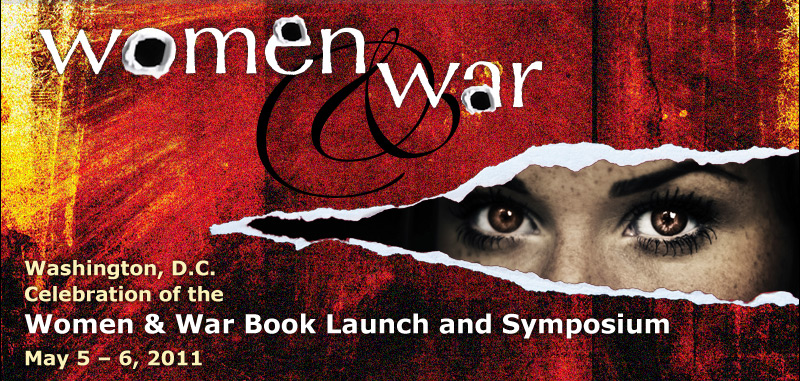Women & War Book Launch and Symposium
The U.S. Institute of Peace (USIP), Peace Research Institute-Oslo (PRIO), and Royal Norwegian Embassy hosted a book launch and international symposium on the next decade of UNSCR 1325 on the afternoon of May 5th and all day on May 6th. The symposium further examined the issues of women and war, power and protection in the 21st century, and explored the implementation of gender-sensitive policies in defense, diplomacy, development, and the role of documentary film, media and the arts in this endeavor.
AGENDA | SPEAKER BIOS | PARTNERS | FAQs

A decade ago, the United Nations Security Council passed Resolution 1325 (UNSCR 1325), which calls for women’s full participation in promoting peace and security and for greater efforts to protect women in war, particularly from sexual violence. However, today gender-based analysis of conflict often remains outside the mainstream of security dialogues.
The book, Women & War: Power and Protection in the 21st Century, underscores that much needs to be done to develop effective conflict prevention and management strategies that are inclusive of women and that give women a voice at the negotiating table. This edited volume is a trans-Atlantic collaborative effort to highlight innovative approaches toward ensuring greater participation of women at the negotiating table, and the ways in which women will make a difference in the security arena over the next decade.
The U.S. Institute of Peace (USIP), Peace Research Institute-Oslo (PRIO), and Royal Norwegian Embassy hosted a book launch and international symposium on the next decade of UNSCR 1325 on the afternoon of May 5th and all day on May 6th. The symposium further examined the issues of women and war, power and protection in the 21st century, and explored the implementation of gender-sensitive policies in defense, diplomacy, development, and the role of documentary film, media and the arts in this endeavor.
Speakers included:
- Dr. Kathleen Hicks
Deputy Under Secretary of Defense for Strategy, Plans, and Forces,
U.S. Department of Defense
Keynote Address: “UN Security Council Resolution 1325 and the U.S. National Action Plan: A Department of Defense Perspective” - Ambassador Wegger Christian Strømmen
Ambassador of Norway to the United States
Royal Norwegian Embassy - Ambassador Donald Steinberg
Deputy Administrator, U.S. Agency for International Development - Ambassador Melanne Verveer
U.S. Ambassador-at-Large for Global Women’s Issues, U.S. Department of State - Pat Mitchell
President and CEO, The Paley Center - Abigail Disney
Filmmaker, Philanthropist, Film Producer of “Pray the Devil Back to Hell,” Founder of Fork Films
With Generous Support From:
Peace Research Institute Oslo (PRIO) and The Royal Norwegian Embassy
Photo Gallery
View the album in full screen.
Explore Further:
- Watch videos from the Women & War Symposium
- Learn more about Women and War: Power and Protection in the 21st Century
- Read a tutorial on UN Security Council Resolution 1325
- Learn more about the November 3-5, 2010 Women and War Conference
- Learn more about USIP's Gender and Peacebuilding Center



